Governor of the Central Bank of Nigeria (CBN) Godwin Emefiele has said the apex bank and the participating financial institutions disbursed over N3 trillion in intervention loans to facilitate economic recovery since the COVID-19 pandemic.
Emefiele said the intervention loans were disbursed to households, Small and Medium Scales enterprises, smallholders farmers to cushion the negative effects of the pandemic.
The CBN Governor stated this at the Ekiti State University (EKSU), Ado-Ekiti, while delivering a convocation lecture titled: “The role of Central Bank in managing economic downturns,” to mark the 40th anniversary of the university.
Emefiele, represented by the Deputy Governor, Corporate Affairs, Mr. Edward Adamu, said N948 bn was disbursed to 4,478,381 small-holder farmers to boost food production in the country.
He added that apart from encouraging farming, the lofty scheme introduced to revive the ailing economy had generated 12.5 m direct and indirect jobs for unemployed Nigerian youths.
The CBN Governor added under the credit facility to help households and businesses that suffered significant losses during the pandemic, that the bank had disbursed N368.79 billion to 778,000 beneficiaries.
Emefiele noted that 648,052 households and owners of Small and Medium Enterprises benefited from the federal government-driven policy.
The CBN boss said: “As you all know, one of the major challenges facing the Nigerian economy is overreliance on revenues and foreign exchange earnings from the sale of crude oil, even though petrol represents just 10 percent of our GDP.
“Moreso, the non-oil sector, particularly agricultural and manufacturing sectors, which contributes about 30 and 13 percent to our GDP have been confronted with low investments, inadequate credit to the real sector and weak infrastructure.
“Furthermore, with an annual population growth rate of 2.8 percent , it was important that all efforts were made available for Nigerians, particularly in sectors that had the potential to absorb youth. We were aware that if necessary support was given to households and business, productivity will rise and investment will flow into our economy,” he stated.
Vice-Chancellor of EKSU, Prof Edward Olanipekun, described the 40 years of the university as impactful, saying the institution has been a reliable training ground for future leaders.
Olanipekun said that the university is experiencing some challenges as a human institution, assuring that no effort will be spared to keep the flag flying in its resolve to be a good citadel of learning for Nigerians.



